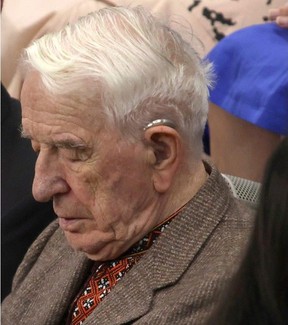The list of names was created by a 1986 federal government war-crimes commission led by Justice Jules Deschenes.

Article content
A Jewish group, supported by dozens of academics and former government officials, is appealing Library and Archives Canada’s decision to keep secret information on suspected Nazis who settled in Canada after the Second World War.
Library and Archives Canada made the controversial decision in November to continue to withhold the list that had been requested by B’nai Brith Canada and others using the federal government’s Access to information law.
Advertisement 2
Story continues below
Article content
The list is among documents created by a 1986 federal government war-crimes commission led by Justice Jules Deschenes. For almost 40 years, the federal government has refused to release the material to the public.
“We must prevent history from repeating itself,” David Granovsky, B’nai Brith Canada’s Director of Government Relations, said in a statement Dec. 19. “It is imperative that everyone understands the degree to which this country was complicit in enabling Nazis to escape accountability for their crimes.”
Library and Archives Canada (LAC) declined to comment.
B’nai Brith Canada has filed its complaint with the Information Commissioner of Canada as well as a request for more information from LAC on the consultations it did which led it to decide to withhold the list of suspected Nazis.
The Information Commissioner’s office noted in a statement Dec. 20 that it cannot discuss specific complaints.
Thirty-nine academics, former government officials and institutions such as the Canadian Historical Association and the Montreal Holocaust Museum signed a Dec. 19 statement supporting B’nai Brith and calling on the Liberal government to release the records. The list also included representatives from the Muslim, Hindu and Ukrainian communities.
Advertisement 3
Story continues below
Article content
Earlier this year, more than 70 academics signed a petition from the Canadian Institute for the Study of Antisemitism “calling for the release of all documentation on Nazi war criminals in Canada.”
LAC consulted in June and July with what it called a “discrete group of individuals or organizations” about whether the list should be made public, according to documents obtained by the Ottawa Citizen. Those consulted included some members of Canada’s Ukrainian community.
But LAC did not include Holocaust survivors nor Holocaust scholars who had advocated for a full release of the list, Jewish groups and Holocaust academics say.
The list is believed to contain names of Nazi collaborators from eastern Europe as well as Waffen SS veterans such as those from a Ukrainian division known as SS Galicia.
The Canadian Polish Congress as well as the Association of United Ukrainian Canadians have also issued their own calls for the identities of the alleged war criminals to be revealed. They pointed out their organizations weren’t consulted by LAC on whether the list should be made public.
Advertisement 4
Story continues below
Article content
The Ukrainian Canadian Congress, which was consulted by LAC about whether to release the records, stated in an Aug. 28 letter that it would go to court to stop the federal government from making public the names of alleged war criminals.

Much of the renewed debate around Nazi collaborators in Canada was prompted by a September 2023 event in which MPs of all parties gave two standing ovations to Yaroslav Hunka, a resident of North Bay, Ont. Hunka was described by then House of Commons Speaker Anthony Rota as a hero and he was thanked for his military service.
But news quickly emerged that Hunka had served in a Ukrainian Waffen SS unit which fought for the Nazis. Large numbers of soldiers from a Ukrainian Waffen SS division came to Canada after the war.
The incident became an international embarrassment for Canada as Holocaust historians, Jewish groups and the Polish government pointed out that Hunka’s unit had been involved in war crimes, including massacres of women and children. The division was also used by the Nazis to crush a national uprising in Slovakia, again prompting allegations of war crimes. There is nothing to suggest Hunka was involved in such incidents.
Advertisement 5
Story continues below
Article content
A Holocaust education organization in Toronto, which also signed the letter of support for B’nai Brith, noted that the release of names is long overdue.
“Canadians deserve full transparency about how Nazi war criminals managed to enter and remain in Canada, escaping accountability for their heinous crimes,” Friends of Simon Wiesenthal Center official Jaime Kirzner-Roberts said in a Dec. 20 statement.
David Pugliese is an award-winning journalist covering Canadian Forces and military issues in Canada. To support his work, including exclusive content for subscribers only, sign up here: ottawacitizen.com/subscribe
Article content
Comments